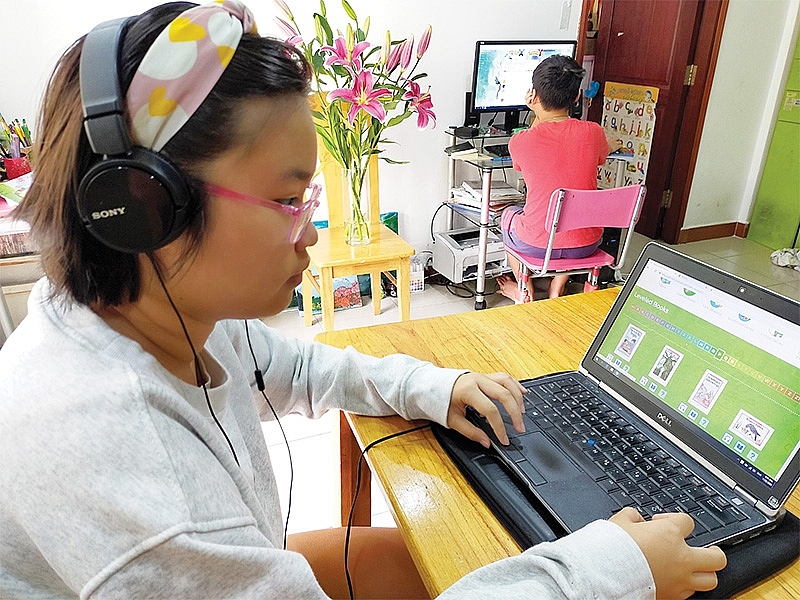Domestic leaders stepping into limelight with e-learning apps
 |
| Some of the more popular conferencing platforms are not catered for true education, Photo: Le Toan |
The COVID-19 pandemic has disrupted education to a major degree, forcing schools across the globe to take classes online. Deciding on a piece of software that would serve as the backbone of their operations has been difficult, not least because institutions and individual teachers had to adopt what is essentially a new modus operandi and thus were lacking a great deal of information and know-how to assess their alternatives. Additionally, like any business, cash-strapped education institutions were reluctant to move towards heavy investment into software and infrastructure meant for use as a stop-gap for the duration of the pandemic.
These considerations turned most to online conferencing software, which did not cover the entirety of their needs, but came mostly free. The most popular choices, Zoom and Skype, indeed rose to dominance for their cost-effectiveness and easy convenience for educators – many of whom are elderly and easily overwhelmed by the plethora of new features to master in a subscription-based, dedicated e-learning solution. Months after switching to online teaching, however, educators and learners alike are starting to point out shortcomings with their software of choice.
Intended for one-on-one or small group video conferencing, the free versions of Zoom and Skype are mostly used by Vietnamese educators for their video chat functions. While some screen sharing and online presentation functionality is built in the software, educators who speak little English or find it difficult to locate these functions hidden under sub-menus rarely use them and so remain inaccessible.
Vietnamese teachers and students often complain about low quality video or audio quality (a common concern for Skype), as well as the limited presentation boards falling short of their needs stemming from teaching habits ingrained over the course of many years.
Demanding crystal clear audio and video quality and seamless functionality from free software can be considered unreasonable at the best of times. There is a strong case to be made that paid applications would offer guaranteed bandwidth for streaming, and paid online teaching solutions could very well live up to expectations – at a significant price.
Domestic solutions
But there may be a game-changer. Vietnam’s three ICT giants of VNPT, Viettel, and FPT have all spotted the gap between supply and demand and have come out with their very own dedicated online teaching suites which they offer completely free of charge, at the very least for the duration of the pandemic.
Since early February, VNPT has rolled out its e-learning product which features live-streaming classes, uploading pre-recorded classes, and online testing in a tight bundle so that teachers and students do not need to keep switching between applications and can stay on top of their tasks easily. Moreover, VNPT E-learning also provides more than 20 different solutions such as e-portals for schools, and e-school reports, among others.
To sweeten the offer, VNPT is offering the application for free and offers free 3G and 4G data to access the system. To date, the application has more than 40,000 users across the country.
Similarly, Viettel has jumped into the fray with the ViettelStudy social network for learning that offers very similar features. ViettelStudy offers curricula for students in primary, secondary, and high schools, and puts no limit on the number of students and teachers. People who wish to share their knowledge with students can register and begin teaching once the app’s consultant council verifies their credentials.
Discussing the moves with VIR, Nguyen Ngoc Linh, deputy general director of Viettel Solutions, the operator of ViettelStudy, said that since February about 3.38 million new accounts have been opened on the social network. The total number of visitors has reached eight million to date, while the number of page visits hit 160 million. Besides that, teachers have created about 80,000 online courses and about 26,000 schools have registered to teach through the platform.
ViettelStudy was developed under the commitment between Viettel and the Ministry of Education and Training regarding ICT firms helping out the education sector during the pandemic, students and teachers can use the app for free for as long as the health crisis lasts.
FPT has also stepped up the promotion of its very own FPT.eLearning which it developed in 2015. Along with numerous schools, FPT.eLearning is used for training by Prudential Vietnam with about 600,000 users, Merck Vietnam (200 users), and Vietnam Airlines (6,000 users). All three software feature an easy-to-navigate interface and offer integrated whiteboard where teachers can make notes for students to copy, as well as share lecture slides and documents prepared in advance.
Another key advantage for Vietnamese users is that the software is written in Vietnamese language, which makes it more accessible than international software.
While Zoom, Skype, and other conferencing tools have filled in a vital role by enabling education institutions and students to carry on during compulsory social distancing, thus making enormous contributions to health and security across the globe, they were a choice of compromise between cost and efficiency. However, local educators no longer need to compromise.
Security and performance
A major issue with the most popular online conferencing software is undoubtedly security: just last week, the globe’s primary conferencing tool Zoom was shaken to the core by news that data of 500,000 Zoom accounts were circulating on the dark web for sale at the price of 20 US cents per account. Users’ trust in Zoom dropped further when the representative of the company affirmed that it sent data of online calls to China. The two most crucial issues for Zoom, as reported by laodong.vn, are that meeting IDs are randomly generated but not password protected; and that the meeting content is not encrypted after the meeting is over, making it easily accessible by unauthorised visitors.
To date, Singapore, Taiwan, and New York have asked schools to stop using Zoom due to security and privacy risks. Furthermore, along with the education sector, technology groups including Google, Tesla, and Space X also ordered their staff members to stop using Zoom.
Similarly, the Vietnamese Ministry of Information and Communications has directed local schools to give priority to local applications, right after news that half a million Zoom accounts were on sale. While many may scoff at claims that locally-developed software is more resilient than other globally-available software, there are merits to choosing local.
| Chinh Phan - CEO, INTEK
All local students deserve access to e-learning methods because of their unique benefits. Vietnamese students lack self-learning skills and online searching skills to complete their learning and knowledge. The traditional education model forces them to be “locked” into strict lesson schedules and programmes that have been around for years. Therefore they lack proactiveness and commitment with their learning and it can affect their future. If they are more used to both online and on-site learning from the start, they will grow not only hard skills but also soft skills very necessary for this digital age. Since opening, we recognise the importance of e-learning and want to contribute to change and create new generations of Vietnamese IT engineers who are internationally qualified. At INTEK, we started our education mission with both online and onsite learning models together with a gamified learning path which brings the most excited and self-motivated mindset to learners. Therefore, students from INTEK have a self-learning mindset, a commitment mindset, and a business-ready mindset that their parents can trust. INTEK students are getting used to applying online learning models, and their learning is still in good progress without barriers. Barbara Holzapfel - General manager, Education Marketing Microsoft
We are relying on technology to support and enable inclusive learning more than ever and students, parents, and teachers want confidence that their interactions are private and secure. Last week, my colleagues summarised our approach to privacy and security in Microsoft teams. Whether through privacy and security controls, protecting identity and data, and ensuring we meet regulatory and industry standards, our first and foremost priority is helping educators maintain a safe and inclusive classroom. Because in the end, this technology is all about supporting people. It is important to realise what is happening at the human level, and the perseverance and creativity we are seeing as teachers, students, and caregivers tackle new situations unlike anything they have ever seen. Moving to distance learning is more than just going online, and maintaining human connections is more important than ever. One day, when we look back on these difficult times, our greatest achievement will have been in how we supported each other. We are so grateful to the talented educators who are working so hard to ensure that their students can thrive. |
What the stars mean:
★ Poor ★ ★ Promising ★★★ Good ★★★★ Very good ★★★★★ Exceptional
Related Contents
Latest News
More News
- Masan Consumer names new deputy CEO to drive foods and beverages growth (February 23, 2026 | 20:52)
- Myriad risks ahead, but ones Vietnam can confront (February 20, 2026 | 15:02)
- Vietnam making the leap into AI and semiconductors (February 20, 2026 | 09:37)
- Funding must be activated for semiconductor success (February 20, 2026 | 09:20)
- Resilience as new benchmark for smarter infrastructure (February 19, 2026 | 20:35)
- A golden time to shine within ASEAN (February 19, 2026 | 20:22)
- Vietnam’s pivotal year for advancing sustainability (February 19, 2026 | 08:44)
- Strengthening the core role of industry and trade (February 19, 2026 | 08:35)
- Future orientations for healthcare improvements (February 19, 2026 | 08:29)
- Infrastructure orientations suitable for a new chapter (February 19, 2026 | 08:15)



 Tag:
Tag:



















 Mobile Version
Mobile Version